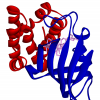I always thought Piracetam was awesome for cognitive decline... Is it saying that Piracetam is useless when it comes to treating cognitive decline? Or is it just saying that Ginkgo deftly outperformed it?
Abstract
Numerous studies have looked at the potential benefits of various nootropic drugs such as Ginkgo biloba extract (EGb761®; Tanakan®) and piracetam (Nootropyl®) on age-related cognitive decline often leading to inconclusive results due to small sample sizes or insufficient follow-up duration. The present study assesses the association between intake of EGb761® and cognitive function of elderly adults over a 20-year period.
METHODS AND FINDINGS:The data were gathered from the prospective community-based cohort study 'Paquid'. Within the study sample of 3612 non-demented participants aged 65 and over at baseline, three groups were compared: 589 subjects reporting use of EGb761® at at least one of the ten assessment visits, 149 subjects reporting use of piracetam at one of the assessment visits and 2874 subjects not reporting use of either EGb761® or piracetam. Decline on MMSE, verbal fluency and visual memory over the 20-year follow-up was analysed with a multivariate mixed linear effects model. A significant difference in MMSE decline over the 20-year follow-up was observed in the EGb761® and piracetam treatment groups compared to the 'neither treatment' group. These effects were in opposite directions: the EGb761® group declined less rapidly than the 'neither treatment' group, whereas the piracetam group declined more rapidly (β = -0.6). Regarding verbal fluency and visual memory, no difference was observed between the EGb761® group and the 'neither treatment' group (respectively, β = 0.21 and β = -0.03), whereas the piracetam group declined more rapidly (respectively, β = -1.40 and β = -0.44). When comparing the EGb761® and piracetam groups directly, a different decline was observed for the three tests (respectively β = -1.07, β = -1.61 and β = -0.41).
CONCLUSION:Cognitive decline in a non-demented elderly population was lower in subjects who reported using EGb761® than in those who did not. This effect may be a specific medication effect of EGb761®, since it was not observed for another nootropic medication, piracetam.
Edited by jroseland, 05 January 2015 - 02:24 PM.






















































